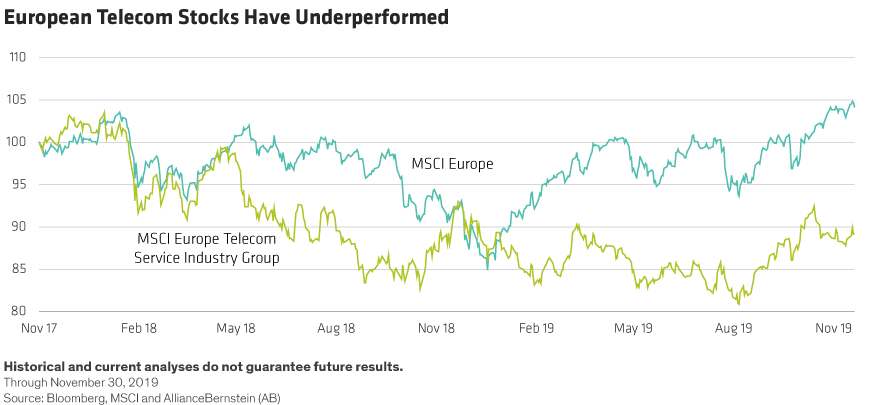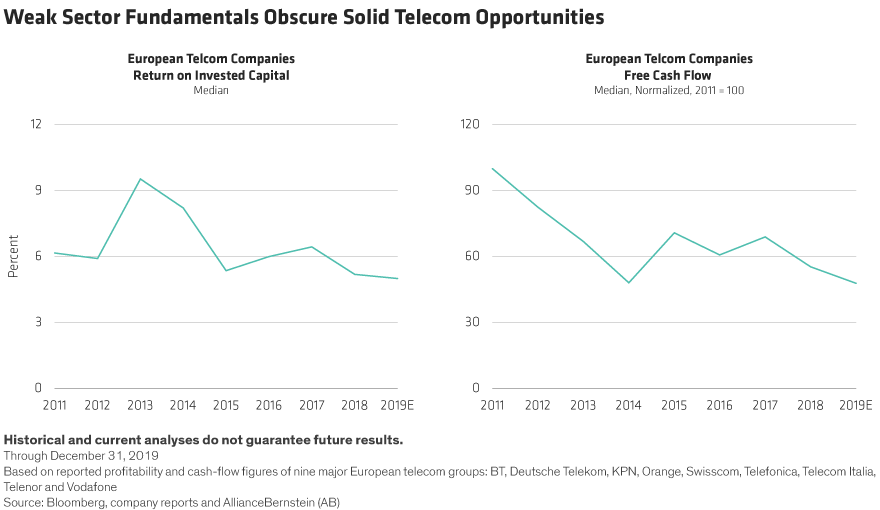In recent years, investors have generally shunned the European telecommunications sector. While the challenges to earnings and cash flows aren’t going away, we think careful research can still identify some good investments in a bad neighborhood.
European telecom stocks have suffered a long spell of weakness. Even as investors have flocked to other sectors with less economic sensitivity, they’ve passed over telecom companies, despite their typically defensive characteristics. Over the last two years European telecom stocks have underperformed the broader European index by about 15% (Display).

Several Concerns Weigh on the Sector
There are certainly real concerns. Many European telecom groups have persistently weak earnings and cash flows. The industry is under pressure to invest ever more in ultra-high-speed fiber-optic fixed networks and fourth and fifth generation mobile networks that can provide excellent data connectivity, even in rural areas. When operators have questioned—rightly in our view—whether the actual service improvements these network investments will provide are economically justified, they have typically lost the argument. At the same time, national politicians and regulators pushing for world-beating connectivity have typically pushed incumbent operators with strong market shares to lower prices, reducing cash flows available to finance the investment needed.
Competition is another big threat. Throughout the continent, new competition in national fixed-line and mobile markets over the last three decades has also put persistent downward pressure on prices. Hopes for significant consolidation to relieve this pressure and reduce fixed costs have been repeatedly dashed. The result has been a near-decade of low profitability and free-cash-flow generation across the industry (Display).

These trends are unlikely to change soon. Telecom will probably remain an unrewarding sector for European equity investors.
Finding Attractive Telcos
But stock pickers should always look beyond the sector smokescreen. Even in industries that may look unattractive from a top-down perspective, research can be used to find hidden gems. In our view, some European telcos do offer attractive return potential today because of a sustainable competitive advantage or because industry dynamics are improving in specific country markets.
Take Spain’s Masmovil Ibercom. The company is gaining share in both fixed and mobile services after entering the market in 2008 with a unique, hybrid network model that keeps costs down through a mix of network sharing and its own build. Wholesale access terms from rivals Orange and Jazztel, agreed as a condition of their 2015 merger, provide Masmovil with a good cost structure that supports attractive pricing packages. As a result, Masmovil has been able to generate return on capital well above industry norms.
Even large incumbent operators are sometimes worth a look. The French market, with four competing players, has long suffered from the negative broader industry trends. Hopes for consolidation have made things worse, as the companies have sacrificed profitability to gain share and strengthen their negotiating position in merger talks. But our research suggests that French telcos have started to realize consolidation is not going to happen. More rational pricing behavior is returning.
Orange, the former France Telecom, is in a particularly good spot. As the company moves beyond the peak of its fiber investment project in 2020, falling capital expenditures should provide a strong tailwind for cash flows. Orange also has a healthy balance sheet, especially compared with its stretched French rivals, which should help sustain recent improvements in industry pricing trends.
European telecom is likely to remain a challenging sector for investors. But careful analysis at the individual company and local industry level can still identify some rewarding calls.
Justin Moreau is Research Analyst—Equities at AllianceBernstein (AB)
The views expressed herein do not constitute research, investment advice or trade recommendations and do not necessarily represent the views of all AB portfolio-management teams and are subject to revision over time. AllianceBernstein Limited is authorised and regulated by the Financial Conduct Authority in the United Kingdom.
MSCI makes no express or implied warranties or representations, and shall have no liability whatsoever with respect to any MSCI data contained herein